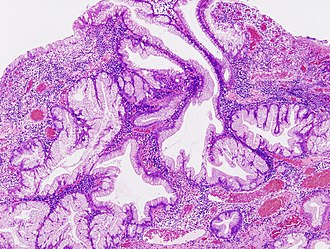Hyperplastic polyp of the stomach
Jump to navigation
Jump to search
| Hyperplastic polyp of the stomach | |
|---|---|
| Diagnosis in short | |
 Hyperplastic polyp of the stomach. H&E stain. | |
|
| |
| LM | abundant foveolar cells and elongated glands, +/-gland dilation |
| LM DDx | fundic gland polyp, juvenile polyp, Peutz-Jeghers polyp, Ménétrier's disease |
| Gross | polypoid mass |
| Site | stomach |
|
| |
| Prevalence | common |
| Prognosis | benign - good |
| Clin. DDx | fundic gland polyp, other gastric polyps |
Hyperplastic polyp of the stomach, also gastric hyperplastic polyp, is a common pathology of the stomach. Hyperplastic polyps more generally are dealt with in the hyperplastic polyp article.
General
- Benign.
- Most common gastric polyp.[1]
Gross
- Polypoid mass.
Microscopic
Features:[2]
- Abundant foveolar cells and elongated glands - key feature.
- +/-Gland dilation.
Negatives:
- No atypical nuclei.
- No hyperchromasia.
- No loss of pseudostratification.
Notes:
- No serrations - as in the colon.
DDx:
- Ménétrier's disease[3] (hyperplastic hypersecretory gastropathy).
- Juvenile polyp[1] - abundant lamina propria, dilated glands may have neutrophils.[4]
- Peutz-Jeghers polyp - thick superficial muscle.
- Fundic gland polyp - doesn't have foveolar hyperplasia.
- Hyperplastic-like polyp in portal hypertensive gastropathy.[5]
- Focal foveolar hyperplasia - foveolar epithelium not as tall (24 micrometres vs. 37 micrometres for a hyperplastic polyp).[6]
Images
www:
Sign out
POLYP, STOMACH (ANTRUM), EXCISION: - HYPERPLASTIC POLYP.
Micro
The sections show antral-type gastric mucosa with hyperplastic gastric pits. No gland dilation is apparent. The epithelium matures to the surface. The lamina propria is not expanded.
Focal neutrophilic inflammation is present. No Helicobacter-like organisms are identified. No intestinal metaplasia is present. No mitotic activity or nuclear atypia is apparent.
See also
- Hyperplastic polyp of the colon and rectum.
- Stomach.
- Ménétrier's disease.
References
- ↑ 1.0 1.1 Jain, R.; Chetty, R. (Sep 2009). "Gastric hyperplastic polyps: a review.". Dig Dis Sci 54 (9): 1839-46. doi:10.1007/s10620-008-0572-8. PMID 19037727.
- ↑ URL: http://pathologyoutlines.com/stomach.html#hyperplastic. Accessed on: 26 July 2011.
- ↑ Park, do Y.; Lauwers, GY. (Apr 2008). "Gastric polyps: classification and management.". Arch Pathol Lab Med 132 (4): 633-40. doi:10.1043/1543-2165(2008)132[633:GPCAM]2.0.CO;2. PMID 18384215. http://www.archivesofpathology.org/doi/full/10.1043/1543-2165(2008)132%5B633:GPCAM%5D2.0.CO;2.
- ↑ Iacobuzio-Donahue, Christine A.; Montgomery, Elizabeth A. (2005). Gastrointestinal and Liver Pathology: A Volume in the Foundations in Diagnostic Pathology Series (1st ed.). Churchill Livingstone. pp. 102. ISBN 978-0443066573.
- ↑ Lam, MC.; Tha, S.; Owen, D.; Haque, M.; Chatur, N.; Gray, JR.; Yoshida, EM. (Nov 2011). "Gastric polyps in patients with portal hypertension.". Eur J Gastroenterol Hepatol 23 (12): 1245-9. doi:10.1097/MEG.0b013e32834c15cf. PMID 22002002.
- ↑ Stolte M, Bethke B, Sticht T, Burkhard U (December 1995). "Differentiation of focal foveolar hyperplasia from hyperplastic polyps in gastric biopsy material". Pathol. Res. Pract. 191 (12): 1198–1202. doi:10.1016/S0344-0338(11)81126-X. PMID 8927566.

